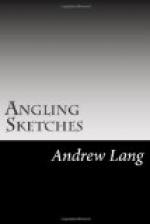Thus ends my hapless friend’s narrative. I leave it to the judgment of women and of men. Ladies, would you have acted as Olive Dunne acted? Would pride, or pardon, or mirth have ridden sparkling in your eyes? Men, my brethren, would ye have deserted the salmon for the lady, or the lady for the salmon? I know what I would have done had I been fair Olive Dunne. What I would have done had I been Houghton Grannom I may not venture to divulge. For this narrative, then, as for another, “Let every man read it as he will, and every woman as the gods have given her wit.” {4}
A TWEEDSIDE SKETCH
The story of the following adventure—this deplorable confession, one may say—will not have been written in vain if it impresses on young minds the supreme necessity of carefulness about details. Let the “casual” and regardless who read it—the gatless, as they say in Suffolk—ponder the lesson which it teaches: a lesson which no amount of bitter experience has ever impressed on the unprincipled narrator. Never do anything carelessly whether in fishing or in golf, and carry this important maxim even into the most serious affairs of life. Many a battle has been lost, no doubt, by lack of ammunition, or by plenty of ammunition which did not happen to suit the guns; and many a salmon has been lost, ay, and many a trout, for want of carefulness, and through a culpable inattention to the soundness of your gut, and tackle generally. What fiend is it that prompts a man just to try a hopeless cast, in a low water, without testing his tackle? As sure as you do that, up comes the fish, and with his first dash breaks your casting line, and leaves you lamenting. This doctrine I preach, being my own “awful example.” “Bad and careless little boy,” my worthy master used to say at school; and he would have provoked a smile in other circumstances. But Mr. Trotter, of the Edinburgh Academy, had something about him (he usually carried it in the tail-pocket of his coat) which inspired respect and discouraged ribaldry. Would that I had listened to Mr. Trotter; would that I had corrected, in early life, the happy-go-lucky disposition to scatter my Greek accents, as it were, with a pepper-caster, to fish with worn tackle, and, generally, to make free with the responsibilities of life and literature. It is too late to amend, but others may learn wisdom from this spectacle of deserved misfortune and absolute discomfiture.
I am not myself a salmon-fisher, though willing to try that art again, and though this is a tale of salmon. To myself the difference between angling for trout and angling for salmon is like the difference between a drawing of Lionardo’s, in silver point, and a loaded landscape by MacGilp, R.A. Trout-fishing is all an idyll, all delicacy—that is, trout-fishing on the Test or on the Itchen. You wander by clear water, beneath gracious poplar-trees, unencumbered with anything but a slim rod of Messrs. Hardy’s make, and a light toy-box of delicate flies. You need seldom wade, and the water is shallow, the bottom is of silver gravel. You need not search all day at random, but you select a rising trout, and endeavour to lay the floating fly delicately over him. If you part with him, there is always another feeding merrily:




